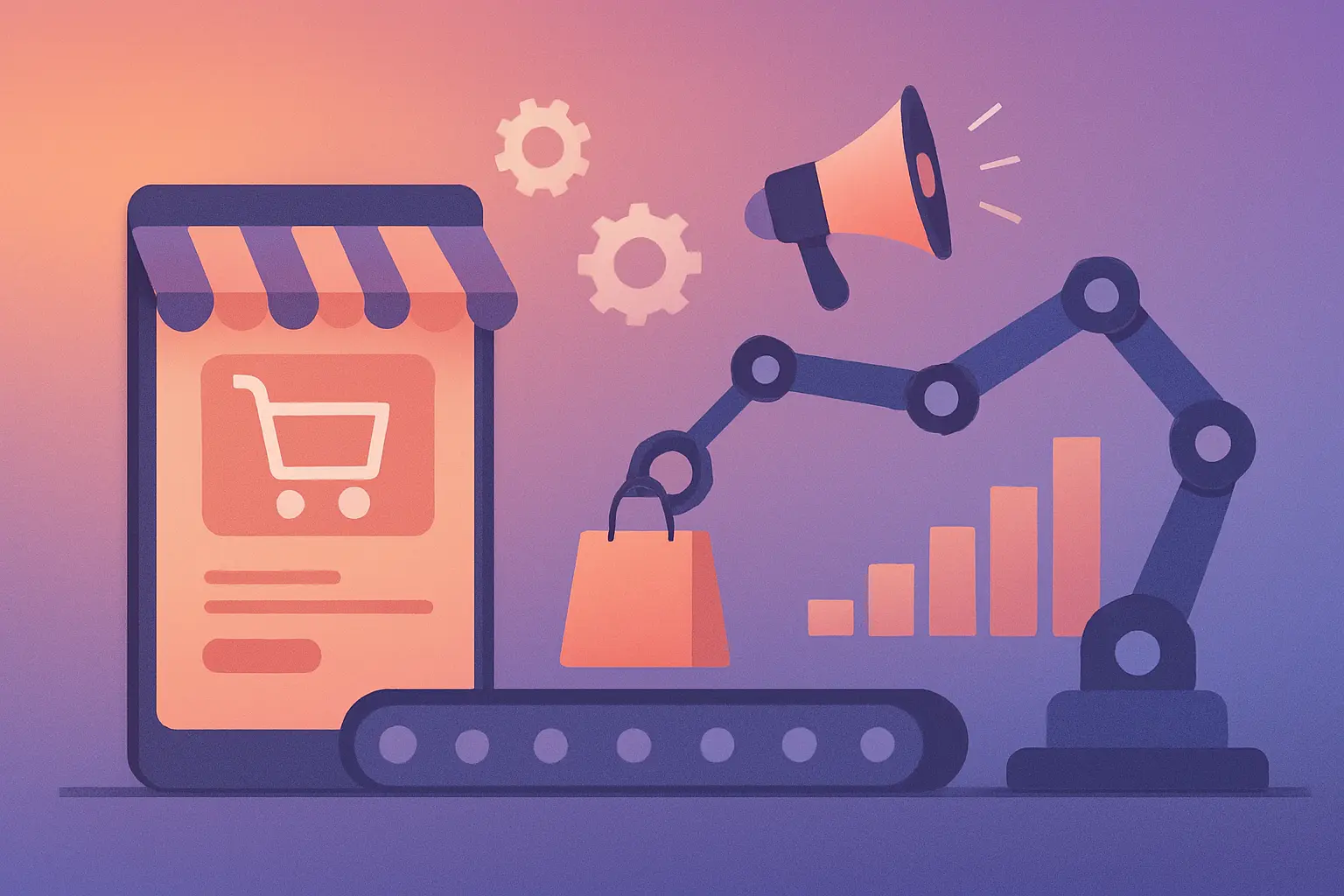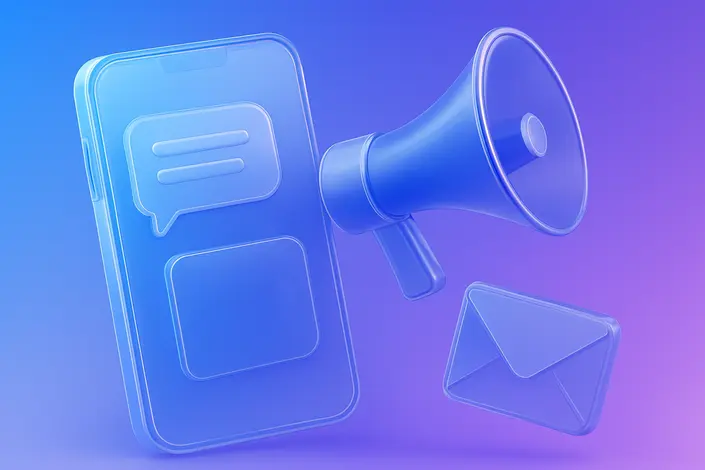What is Marketing – A Beginner’s Guide
- August 21, 2023
- 15 mins read
- Listen

If you run a business, you know that the biggest challenge is always to win and retain customers.
To achieve this goal, you must first create awareness and visibility in the market. After all, your target audience will get attracted only when they know about your products and services.
When the audience knows your business and product, it becomes easy to reach them, engage them, and convert them with the right offers. This is where marketing makes all the difference, whether you want to create awareness, win customers, or retain them for repeat purchases.
A well-planned marketing strategy can give you a competitive edge in the market and set your business up for long-term success.
In this post, we will explore marketing in detail, and understand its various facets, including the definition, types, and strategies.
But first, let’s get started with understanding the definition of marketing…
What is Marketing?
Marketing is a fundamental aspect of business that helps organizations connect with their audience, build relationships, and boost sales. It refers to all the activities and strategies employed to promote products, services, or the brand to the target audience for achieving specific business goals.
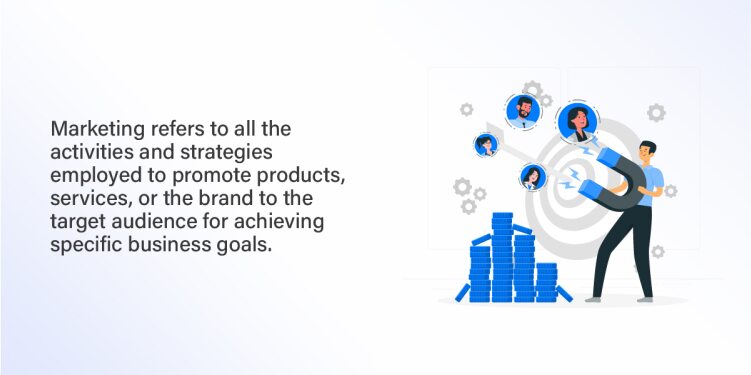
Marketing is also about –
- Creating, communicating, delivering, and exchanging offerings that add value to customers
- Building meaningful connections with the audience to drive long-term success
- Focussing as much on selling products or services as adding value to customers and other stakeholders
Key Elements of Marketing Strategy
Marketing involves various interconnected and interdependent key elements that work together to help in the creation of a robust strategy for brand, product, or service promotion. Each element should align with the overall business objectives to offer a consistent experience to customers and forge meaningful relationships.
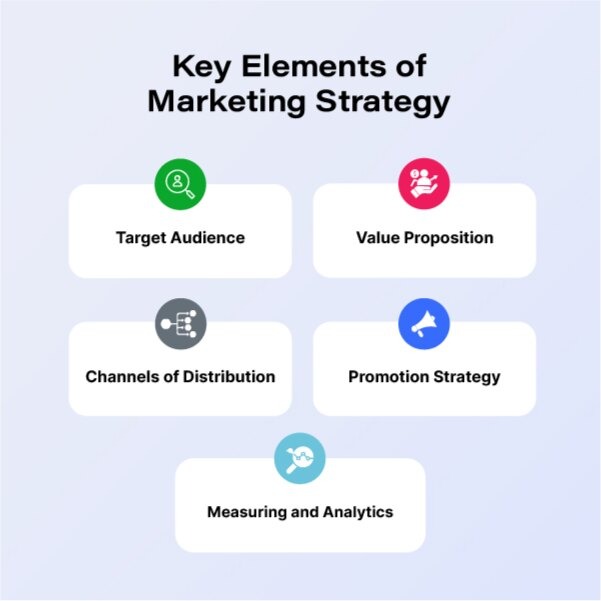
Here are those key elements –
- Target Audience – The foundation of marketing is built on identifying and understanding your target audience.
- Value Proposition – Clearly articulating your value proposition is a key element of a successful marketing strategy.
- Channels of Distribution – Selecting the right channels of distribution is vital to take your offerings to the audience.
- Promotion Strategy – Choosing the right tactics to create brand awareness and attract customers is the pillar of marketing.
- Measuring and Analytics – Measuring the performance of your efforts is essential for knowing the success, or lack of, marketing.
Basic Principles of Marketing
Marketing exists to help businesses reach their target audience, create valuable offerings, and achieve their objectives. All the goals can only be achieved when a business uses the basic principles of marketing and uses strategies aligning with its needs.
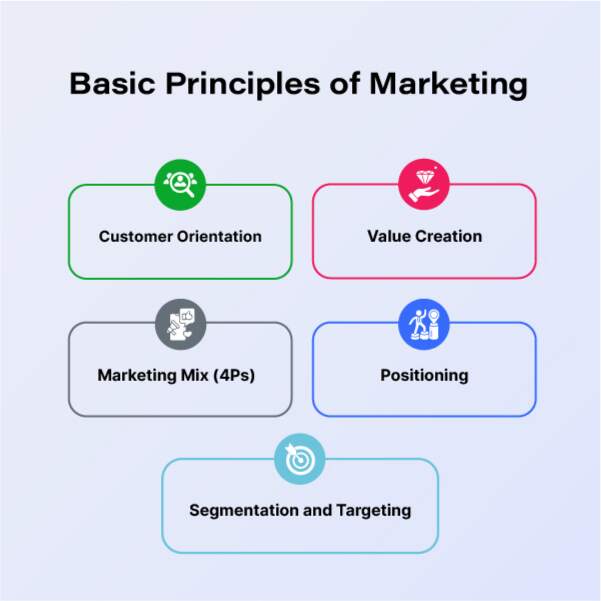
Here are those basic principles –
- Customer Orientation – Putting customers at the center of all activities is the basic tenet of marketing. This means a business should create products and services in a way that meets customer needs and that is in tune with the customer’s preferences and behaviors.
- Value Creation – One of the basic principles of marketing is to create value for customers. This means a business should focus on offering benefits or solutions that meet and exceed the expectations of the audience.
- Segmentation and Targeting – To leverage the full potential of marketing, it’s important to segment the audience on key factors such as demographics, psychographics, and behaviors. Based on the segmentation, it becomes easy to target the specific audience group that matches your business’ strengths and goals.
- Positioning – It’s important for a business to position its products or service in a unique way that sets it apart from others and creates a compelling brand image in the minds of potential customers.
- Marketing Mix (4Ps) – Developing your marketing mix is key to successfully meeting the needs of the target audience. It involves working on the 4Ps of the marketing mix, i.e. Product, Price, Place & Promotion, to ensure value to customers with each aspect of the offerings.
Why is Marketing Important?
Having a great product or an amazing service is not enough to attract customers. Your business will need to build awareness in the market as the more people know about you or your brand, the more chances are they will come. This is where marketing can help.
There are many reasons why marketing is essential for any business –
- Marketing is key to reaching your target audience, letting them know that your business exists, and demonstrating your products and services to them.
- Regular marketing initiatives and efforts are vital for not only creating a brand identity but also enhancing it which can probe a differentiator in the market.
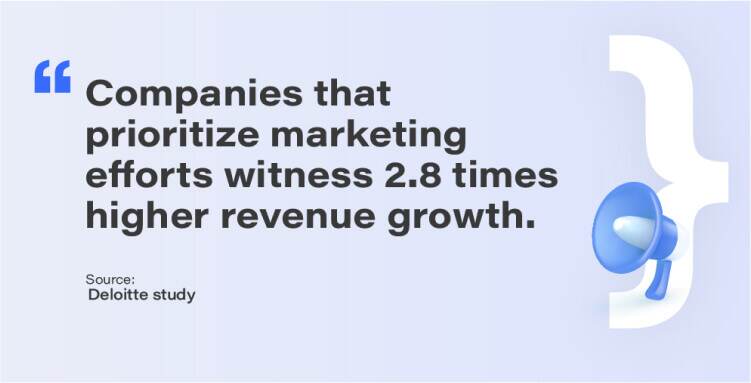
- Marketing is at the core of customer engagement as strategic communications through various channels can help a business win loyal customers.
- One of the key aspects of marketing is to develop products or services that align with the needs, preferences, and behaviors of customers.
- The ultimate purpose of marketing is to generate sales and drive revenue which can be achieved by increasing interest and inquiries from customers.
- Marketing gives businesses a great opportunity to showcase their unique value proposition and stand out in the market.
- A business can leverage marketing insights to guide product development and accommodate customer feedback and market trends, resulting in superior offerings.
- Marketing is the primary mode for businesses to communicate with the audience, share important information with them, convey the message, and do promotions.
Get inspired by exploring 85 powerful marketing quotes that will boost your motivation
B2B and B2B Marketing – What are they?
B2B and B2C are two distinct approaches to marketing that differ in the type of target audience they cater to.
In B2B marketing ( business-to-business), a transaction happens between two businesses or organizations where one sells while the other buys. In this type of marketing strategy, selling to individual customers is not a priority as the sales team will focus on answering questions from business clients. More than selling a product or service, this form of marketing focuses on building long-term relationships with clients as transactions involve online partnerships and contracts.
On the other hand, B2C marketing ( business-to-consumer) concerns itself with individual customers as the goal is to meet their needs, preferences, and emotions. In this type of marketing, the greater focus is on creating repeat customers through positive experiences.
Different Types of Marketing
Marketing evolves with time and also with the technological changes around it. It can take various different forms depending on the method and tactics used. A business can use one or more forms to create brand awareness and drive sales. Here are some of the most popular types of marketing –
Content Marketing
It’s a strategic marketing approach where the focus is on publishing and distributing relevant content to engage and attract a target audience. The role of content marketing is to offer information and guidance to the audience and help them build insights. The key element of this marketing is to create value-driven content in the form of blog posts, articles, videos, how-to guides, podcasts, and more and promote the brand through them. More importantly, over 70% of marketers (both B2B and B2C) use content marketing as part of their overall marketing strategy.
Social Media Marketing
It involves the use of social media channels and platforms to engage with the audience and build relationships with them. The aim of social media marketing is to leverage the tremendous popularity and reach of social networks and achieve business goals.
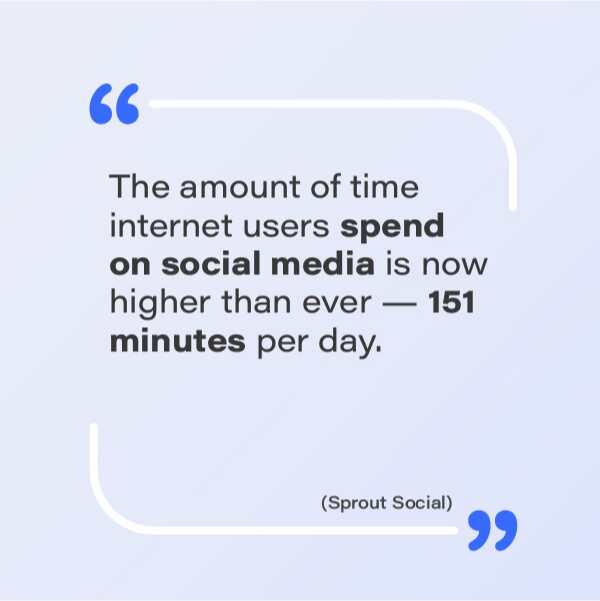
With different platforms catering to unique demographics, a business can use a combination of free and paid ads on social channels to achieve marketing goals.
Search Engine Marketing (SEM)
It’s a digital marketing strategy that focuses on boosting a brand’s visibility in search engine result pages. This form of marketing users paid ads and optimization to increase the rankings in major search engines and drive traffic.
SEM consists of two elements –
- Search engine optimization (SEO) – It’s a unique marketing strategy that optimizes the website performance and its different elements to increase rankings on search engines. By using SEO, a website can achieve a top position in search engines and drive organic traffic.
- Pay-per-click (PPC) advertising – PPC advertising is a paid form of boosting a website’s rankings in search engines and driving traffic. It involves placing ads in search engine results and then paying a fee as and when the ad is clicked.
Email Marketing
It involves the use of email for sending targeted messages and promotional materials to your subscribers. Email marketing is considered a powerful way to engage with your audience in a direct and personal manner.
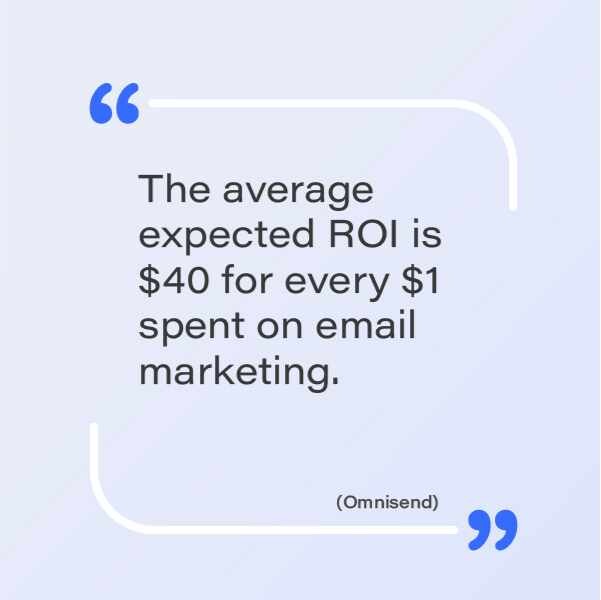
By using this form of marketing, a business can share valuable content with the audience, promote products or services, and forge meaningful relationships with its audience. As a dynamic digital strategy, email marketing is viable for not only promotion but also for driving conversions and fostering brand loyalty.
Affiliate Marketing
It’s a collaborative online marketing strategy where organizations partner with affiliates ( individuals or companies ) to promote and sell their products and services. The concept of affiliate marketing is based on paying a commission for each lead, sale, or marketing effort. In this type of marketing, a performance-based model is used so that both the involved parties could mutually benefit. Affiliates can help drive conversions, traffic, and sales through strategic outreach and promotions. More so, 90% of merchants consider affiliate marketing a key part of their marketing strategy.
Inbound Marketing
It’s built on three pillars – attract, engage, and delight. The focus of inbound marketing is to attract potential customers rather than reach out to them or interrupt them through promotional methods. In this form of marketing, the emphasis is on establishing a solid online presence and naturally attracting customers through measures such as content creation, social media marketing, email marketing, automation, etc.
Outbound Marketing
It’s also known as interruption marketing where the focus is on actively reaching out to the target audience and initiating contact with them through various channels. Unlike inbound marketing, it is used by businesses to capture the attention of a wide audience, resulting in a higher cost per impression and a lower level of personalization. Outbound marketing is not suitable when the goal is to connect and engage with customers in a more targeted manner.
Learn more: 15 WhatsApp Marketing Strategies for Your Business
A Step-by-Step Guide to Developing an Effective Marketing Strategy
Your business needs proper planning and some strategy to achieve its specific goals. The key is to find relevant tactics to build brand awareness and attract customers. An effective marketing strategy can help your business devise robust planning to achieve the desired growth and drive conversions.
Here is a step-by-step guide to building an effective marketing strategy for your business –
1 – Define Your Business Goals
Your marketing efforts will provide great results only when they are in alignment with your specific business goals. In fact, the goals you set for your business will provide direction to all your marketing efforts. So, whether you want to boost brand awareness or increase revenue, the objectives should be clear to leverage the optimal potential of marketing.
Key Features
- Your business goals should be specific and measurable and they should also be well-defined and realistic.
- The goals you set for digital marketing should align with the mission and vision of your business as this will help in decision-making and resource allocation.
2. Understand Your Target Audience
Your business can never build an effective marketing strategy unless it understands the target audience. After all, a business must know the people or groups who are most likely to be their potential customers. When a business understands the target audience, it can easily tailor its marketing efforts and messaging to address the specific needs and pain points of the potential customers.
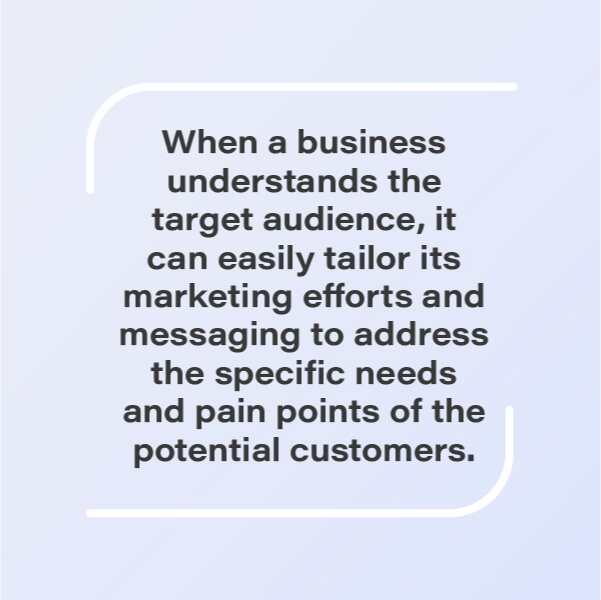
Key Features
- Create detailed customer personas or profiles with key demographic, psychographic information to better understand the needs of your audience.
- Collect information about the behaviors and preferences of your audience and then consider segmentation to make your marketing efforts more personalized.
- Create a customer journey map, then map the journey to know the touchpoints ( where customers interact with your brand ) and solutions for each stage.
3. Determine Your Unique Value Proposition
Customers often trust faith in brands that offer them value. So, as a business, your foremost priority should be on determining what sets you apart from competitors and what makes your products or services a good choice for customers. If you’re able to define your brand’s identity and connect with the audience at a deeper level, there is a high chance that customers will show interest in your offerings.
Key Features
- Do an honest assessment and evaluation of your products, services, or brand to know whether they really add value to potential customers.
- Highlight the benefits your products or services offer and focus on demonstrating how your offers can improve the lives of potential customers or add value to them.
4. Choose Your Marketing Channels
Choosing the right channel is important for effectively engaging and communicating with your audience. It helps you understand where and how to reach the audience and deliver your message to them. The right selection of the channel can help your business be where the audience is which can enhance the chances of meeting and connecting with the potential customers.
Key Features
- Get data on where the target audience spends their time online, and research their preferences of channels for connecting with business.
- Invest in channels that match your audience’s interests and behavior, and consider adopting an omni-channel approach to maximize reach and engagement.
- Create a channel-specific content strategy and also analyze how your competitors are leveraging different channels.
5. Develop Your Content Strategy
Content is the foundation upon which your business can make an effective marketing strategy. When you have a well-defined content strategy, it means you understand what type of content to create and how to distribute them to engage with the audience. It’s the content that will keep your audience engaged in your brand as sharing relevant content boosts your authority and generates curiosity among the audience.
Key Features
- Define the purpose your content will serve as you should be clear whether you want it to inform, educate, entertain, or inspire.
- The content you create and distribute should address the specific needs and pain points of the audience.
- Create a content calendar and determine beforehand the types of content you will create and share.
6. Develop Your Marketing Mix
The marketing mix comprises four key elements – Product, Price, Place & Promotion. All the elements work together to create a robust marketing strategy for a business. So, developing the marketing mix is important to get all the elements that help in promoting your products or services effectively.
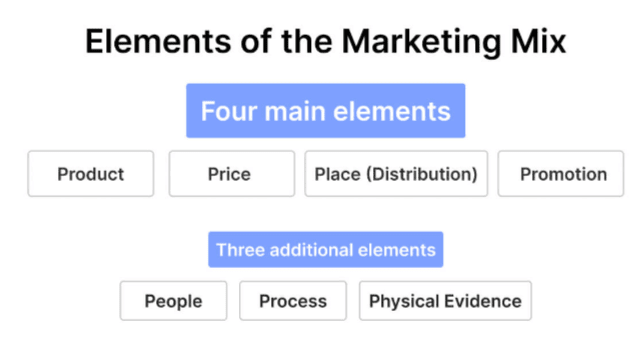
When you have developed the marketing mix, it means you have covered all the bases and you know how to promote your offers, how to market, what price to choose, etc.
7. Plan Your Marketing Campaigns
A well-planned and well-structured marketing campaign is key to achieving your specific business goals in a defined time frame. It helps you achieve consistency in messaging across channels, resulting in better engagement and conversions. When the campaign is crafted keeping in mind the audience, it resonates with them and arouses interest in your products and services.
Key Features
- Set clear objectives with each campaign and identify the intended audience you want to target.
- Craft a compelling message that not only communicates the value of your offers but also addresses the pain points of your audience.
- Set the right channel for your campaign and ensure the budget and timeline are in tune with the specific goals.
8. Monitor and Measure
Tracking and measuring the performance of your marketing efforts is important as it informs whether your strategy is heading in the right direction. If you don’t monitor and measure, how can you know what’s working and what needs improvement? With regular measurement, you can make necessary adjustments, resulting in a boost to marketing ROI.
Automate Various Aspects of Your Marketing with REVE Chat Tools
The success of your marketing strategy will depend on the efforts you put in and the processes you leverage. At REVE Chat, we understand how automation could be a great differentiator in streamlining your entire marketing process.
With us, you find a range of customer engagement tools that can help automate various aspects of your marketing tasks. You can use our AI-powered chatbot and speed up your marketing, together with automating some key tasks.
Using our live chat software in combination with the chatbot can take your customer engagement effort to the next level.
Final Thoughts
Marketing is a dynamic concept and it keeps evolving with time. The key is to use the right tools and technology and make marketing efforts as productive as needed.
With REVE Chat, you will get a range of engagement tools that can enhance the performance of your marketing process.
So, you can sign up and check how our tools can prove a value addition to your marketing endeavors.


